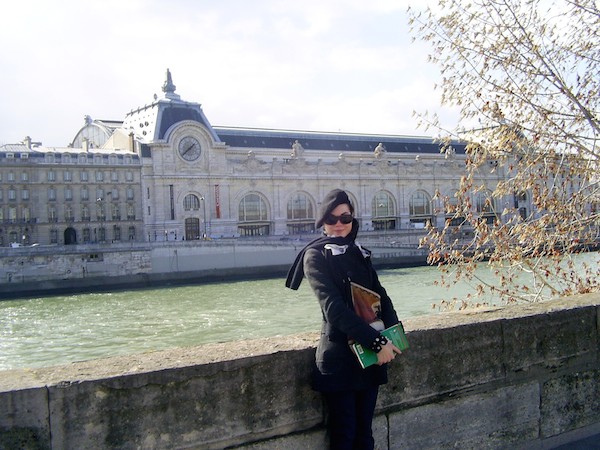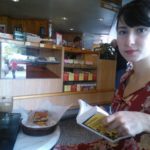A Conversation with Study Abroad in Paris Expert Andrea Bouchaud

Andrea Bouchaud studied abroad in Paris at age 20, and then wrote two books about the experience. Now Bouchaud works to educate other women who are thinking of studying abroad in Paris–and help them manage their expectations and make the most of their time in the City of Light. I loved interviewing Bouchaud and learning about her own experience in Paris, which, as it turns out, wasn’t all sunshine and roses.

- Andrea in Paris
Rachel Sales: Tell us about yourself. Where are you from? What do you do when you’re not traveling to Paris?
Andrea Bouchaud: I’m Andrea Bouchaud, the internet’s favorite Paris study abroad expert. My own roller coaster study abroad experience in Paris along with other students’ similar experiences inspired me to write two books, Twenty in Paris: A Young American Perspective of Studying Abroad in Paris and The Paris Diaries: The Study Abroad Experience Uncensored. I teach students how to have a successful and stress-free study abroad experience in Paris through my books, blog and YouTube videos. I’m from New Jersey but relocated to Dallas, Texas a few years ago. When I’m not traveling to Paris, I’m traveling around the world and growing the Twenty in Paris website to become the Ultimate Paris Study Abroad Resource.
RS: Why did you choose to study abroad in Paris?
AB: That’s a fun story. I was interested in living in Paris ever since a high school French class trip when I was 17 but my university didn’t offer a program in Paris–only in Tours. But it didn’t matter to me–France is France and I was just excited at the prospect to live and study there. During my registration for the Tours program, it was canceled and I had to find another one. My next program was in Nice–the thought of being near the beach was enticing but expensive.
I had an idea to live with my grandfather’s sister for the summer in Paris before going to Nice to get used to speaking French. When she heard the idea, she offered me a studio apartment in Paris to stay in for free, which was a financial relief my parents and I couldn’t pass up. So I ended up in Paris because it was the most affordable. It also gave me the opportunity to connect with my long, lost French family whom my grandfather gave up to become American.
RS: How did your study abroad experience change you?
AB: It changed me in more ways than I expected! I didn’t go abroad expecting to change so I was really shocked when I realized that to succeed in this experience I was going to have to change a lot about myself. At first I rejected changing myself because I thought my personality didn’t need any tweaking. I’m a little stubborn by nature so it took time for me to realize that I was the new gal in town, not the French, and that if anyone was going to change to the other one’s standards, it was going to be me.
So what were these changes? Becoming accepting of and embracing a different way of doing everything; being humble–the most humbling experience you’ll ever have is not being able to speak effectively in another language; making cultural faux-pas and learning from them so as to not offend anyone and immerse into the new culture; Stopping to enjoy life and take good food seriously!
I learned a lot of life lessons in Paris that come in handy all the time – here are my top three that I live by:
1. Never hold someone else (or another culture) to your standards.
2. Do your research before any new experience to help create realistic expectations.
3. Don’t take yourself too seriously and learn to adapt to new situations.

- Andrea’s experience in Paris wasn’t perfect right from the beginning. She had to overcome tons of challenges before she settled in.
RS: What were the most memorable parts of your study abroad experience? What were your greatest challenges?
AB: My fondest memories of studying abroad are walking around Paris, especially in the spring and at night–it’s so beautiful! I would spend hours every weekend simply strolling the city and taking in the sights and sounds of the most beautiful city on Earth. My most memorable evening stroll was walking along the Seine River. I came up behind Notre Dame Cathedral perfectly illuminated in the dark sky to the sound of a traditional French accordion being played by a busker while Parisians dined at a small café outside smoking a cigarette and eating a pastry. So quintessentially French! I also really enjoyed meeting my long, lost French family. It was fascinating to discover the people whom my paternal grandfather grew up with in his life before coming to America; to find out family secrets and historical tidbits that lay dormant for generations. All of my fondest memories of Paris were forged in the last five months of my stay because the first five months were extremely difficult for me.
I went to Paris starry eyed with dreams of being embraced by the French, making lots of friends, going out often, and having kick-ass French speaking skills. What was really waiting for me was spending every night and weekend with a 76-year old distant relative, worse French skills than I realized, and my personal resistance to immersing into French culture. I didn’t research anything about French culture or talk to a native before going abroad. I believed that Paris was going to be exactly how I dreamt it. When I found out that Paris is a normal city (albeit, a beautiful one) with the same issues as anywhere else, that my French stunk and that I didn’t dress or look like the Parisians, I rejected the culture and the entire experience. It was a very dark time for me. However, things turned around once I accepted that my unrealistic dreams were to blame and not the French.
RS: Do you think studying abroad in Paris is for everyone? What type of person will get the most out of studying abroad in Paris?
AB: Paris is a great city and it has something for everyone, however, I recognize that it is not for everyone. I wrote an article a while back about how Paris was not the ideal host city for me to show students how to determine if Paris is the right study abroad location for them. I’m an introvert–meaning I don’t like large crowds or busy environments. Paris is a big international city, and I often felt it was too big for me. Although I’m very fortunate to have been able to call the City of Light home for a year, I believe that I would’ve done better in a smaller city. If you’re an extrovert or someone who always likes to be out and doing things, then Paris is a great study abroad location for you! If you’re more of a homebody, try a smaller town/city–you can always visit Paris on a weekend trip, which will give you the perfect dose of the big city life.
RS: Let’s talk about Parisian men. What should women who are interested in dating Parisian men know?
AB: I wish I had a great story from a personal dating experience…but I don’t. I had a long-term boyfriend at the time and maintained a long-distance relationship where I didn’t see him for a year! During my time in Paris, we only talked on the phone and emailed–I didn’t have a laptop so we couldn’t even Skype. It was really difficult and distracting from the study abroad experience to try to have a boyfriend on another continent.
When it comes to study abroad, I recommend dumping your college sweetie. At 20-years old, you don’t need to find your life partner (and chances are your current boy/girlfriend is not going to be the one). If it’s meant to be, you’ll rekindle your love when you return home. When it comes to dating during a study abroad, my best advice is don’t go abroad expecting to fall in love. Chances are it won’t happen. Out of roughly 40 American students that year, only two dated Parisians. If you do find yourself attracted to a Parisian man during your study abroad, here are a few tips to help you navigate your new romance:
1. Be yourself but remember that French women aren’t as direct as American women. You’ll need to tone down your American spirit if you want your French lover to be receptive to your requests.
2. In France, if you say you will do something, you better do it! Flakiness is not as easily forgiven as it is in American culture.
3. Be safe! Before any romantic relationship, you and your partner should get tested to make sure that you are both sexually healthy. Also, talk about expectations, boundaries and maintain open communication with your partner.
4. Throw all stereotypes out the door and embrace French culture/language.
RS: Do you have any safety tips for women traveling in Paris?
AB: Compared to American cities, Paris is pretty safe but you should always take steps to ensure your safety. Here are my favorite five tips to stay safe in France’s capital:
1. Avoid going to Pigalle after dusk. American soldiers called this district “pig alley” for a reason–it’s home to prostitutes and drug deals in Paris as well as the famous Moulin Rouge. If you want to get a photo-op with the famous red wind-mill, make sure you do it during the day.
2. Do not accept “gifts” from strangers. When you walk around Paris especially at Notre Dame and Sacre Coeur, there will be people (mostly men) saying that they want to give you a bracelet. This is a scam! It starts with one man doing the bracelet and once he finishes, all of his buddies show up to pressure you to give them money. Best advice: don’t accept gifts from strangers and you’ll be fine.
3. Carry your valuables in a passport necklace. Passport necklaces are small and the safest place for your cash, ID and credit cards as they’re worn under your shirt. Paris is home to many pickpockets (especially on the metro). The best place to keep your valuables is on your body where no one can get to it.
4. Put French emergency numbers in your phone. 911 is not a universal number. In the event of an emergency, you can call the fire department (les pompiers) by dialing 18 or the police (la police) by dialing 17.
5. Respect French culture and speak some French. The best way to be taken for a native is to act and speak like one. Before going abroad, read up on current French culture via the news as well talk to a native so that you can respect the cultural traditions and not offend anyone or worse, end up in legal trouble. Respecting the local culture and speaking the language will not only help you have a better, authentic experience, it will help you to avoid cultural misunderstandings.
RS: What’s it like to be an American in Paris?
AB: It’s fun, frustrating, enriching, lively, easy, and difficult. Life abroad as a foreigner is never monotonous. American women are dynamic, loud, direct and bold. We stick out among the more formal and mild Parisiennes. Sometimes it’s a good thing to stick out and sometimes it’s not. You can never really give up your native culture, but you can adapt to the new culture. The French way of life is enriching and easy–you’ll discover the importance of company (and learn to be choosier about friends), the importance of a good meal, the importance of taking a break and enjoying the small pleasures of life.
It’s frustrating because the American in you will want to get things done ASAP but speed is not the French way. I don’t mean that negatively, it’s just that they are not as “results at any cost” driven as Americans.
French life is difficult for Americans because it seems similar on the surface but it is so very different and it can take a while to get used to these differences. It’s fun, lively and enriching because, well, you’re living in Paris! It’s the most beautiful city on Earth with a rich history and culture, and world class attractions. Your journey to discovering and enjoying Parisian life will have its ups and downs but the chance to live the French life as an American is priceless.
RS: Anything else you’d like the Pink Pangea community to know?
AB: Studying abroad is a profound experience in a college woman’s life. The lessons you’ll learn and experiences you’ll have will positively impact your college experience as well as your life. Living in Paris has been the highlight of my twenties as well as given me an edge in my professional career. Still not sure about the Paris study abroad experience? Check out twentyinparis.net and sign up for the free monthly newsletter for more information, tips and stories or connect with me on Twitter @twentyinparis.
Photos by Andrea Bouchaud.








